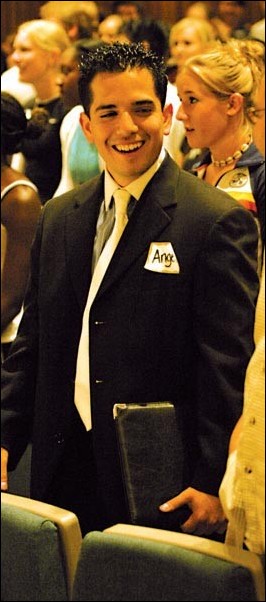ASI Board Members Debate Election Code
Image: ASI board member appointments delayed:ASI President Angel Barajas said he has delayed the appointments of two vacant seats on the ASI board because there are so many strong candidates.Hornet File/Andrew Nixon:
November 3, 2005
The Associated Students Inc. board members debated recent Election Code revisions made by ASI counsel Larry Garcia and the Election Code Task Force at the ASI working board meeting Wednesday.
The revisions were prompted by complaints and confusion from previous ASI elections, Garcia said.
The code, which dictates candidate procedures and requirements during the ASI elections held in April, is in its 10th revision since the code’s conception in 1991.
During the weekly meeting, board members prompted discussion of the new additions to the code (470 total additions were made). The most contested issues discussed included election publicity, campaign money and ASI endorsement of referenda.
Secretary of State Affairs Curtis Grima addressed his concerns about candidate’s campaign chests ?” the amount of money those running can use for election purposes. The code allows executive positions to spend $500 and board member positions to spend $250 total including donations and charity.
“Can students really afford this?” Grima asked the board.
ASI Pres. Angel Barajas said that ASI tried lowering the campaign money flow by capping the numbers at $100 for executives and $50 for board members, but then candidates got too creative, “and got themselves into a whole bunch of trouble,” he said.
“Spending limits have been a point of debate ever since I’ve been involved here,” said Patricia Worley, ASI executive director.
Clifford Hawley, director of natural sciences and math, said ASI assessed other campuses’ spending limits before raising the spending caps for ASI candidates.
There are no spending limits at some California State Universities and a recent student body presidential election at San Diego State cost students $3,000, said Robbie Abelon, executive vice president.
Abelon also suggested that ASI should still be allowed to support referenda on the ballot that ASI authors.
“It’s still an even playing field if ASI endorses it,” Abelon said.
However, Vice President of Finance Bonnie Sugiyama said ASI should focus on educating students rather than promoting their own stances.
Worley said last election when the Health Center placed their universal health initiative on the ballot, the organization was only allowed to promote awareness and not try and sway students’ votes because it might present an unfair advantage for students who don’t have the resources to organize.
All board members agreed that ASI should not be able to put money into promoting any candidate, referenda or campaign.
Vice President of Finance Bonnie Sugiyama requested that the board allow more time for students to turn in applications before the election deadline so that more students would know about the election and get involved.
“The question may be about publicizing the event,” Worley said. She said getting the word out about the election will make the most difference in student participation.
The board will review the new Election Code additions during the Nov. 9 meeting where board members can motion to either change the code or pass it. If amendments are approved by the board, the code will be sent back to the Election Task Force for further review.
The reason for the recent changes is to “promote clarity and responsibility in the election process,” Garcia said.
Jessica Weidling can be reached at [email protected]







































































































































